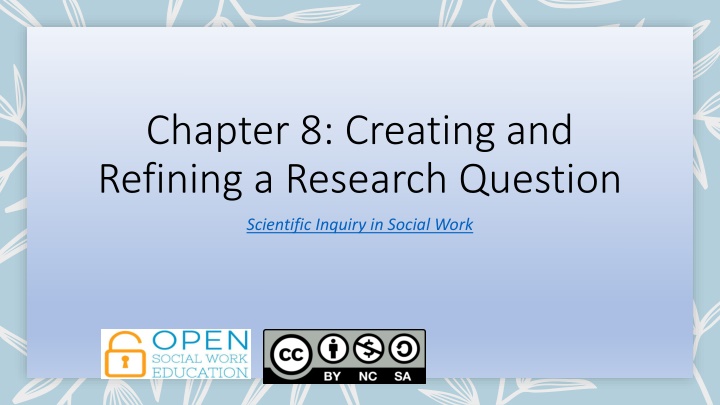
Crafting a Strong Research Question in Social Work Studies
Explore the iterative process of creating and refining research questions in social work. Learn about ethical vs. empirical questions, the importance of feasibility, and matching questions with the right study design. Understand the characteristics of a good nomothetic research question and the distinction between empirical and ethical inquiries to enhance scientific inquiry in social work.
Download Presentation

Please find below an Image/Link to download the presentation.
The content on the website is provided AS IS for your information and personal use only. It may not be sold, licensed, or shared on other websites without obtaining consent from the author. If you encounter any issues during the download, it is possible that the publisher has removed the file from their server.
You are allowed to download the files provided on this website for personal or commercial use, subject to the condition that they are used lawfully. All files are the property of their respective owners.
The content on the website is provided AS IS for your information and personal use only. It may not be sold, licensed, or shared on other websites without obtaining consent from the author.
E N D
Presentation Transcript
Chapter 8: Creating and Refining a Research Question Scientific Inquiry in Social Work
Chapter Overview Creating a research question is an iterative process, one version after another. In the preceding chapters, you started with an initial question and refined it as you learned more about the topic you re studying. In this chapter, you will finalize your research question. You will examine: Ethical versus empirical questions Importance of writing a good research question that is feasible and important to your field of study Determining if it s a quantitative or qualitative research question Matching your question with the right study design Once this process is completed, you ll be ready to start answering your question.
Remember from last chapter Idiographic study or discovery of new scientific facts or processes, exploring ideas that we don t know much about Nomothetic generalization of information to different populations, testing an idea from a theory based on existing information
Characteristics of a good (nomothetic) research question It is empirically focused It is written in the form of a question It is clearly written Can not be answered with just yes/no It has more than one plausible answer It considers relationships among multiple variables It is specific and clear about the concepts it addresses It contains a target population
Empirical vs. Ethical Social workers are best equipped to answer empirical questions those that can be answered by real experience in the real world as opposed to ethical questions questions about which people have moral opinions and that may not be answerable in reference to the real world. While social workers have explicit ethical obligations (e.g., service, social justice), research projects ask empirical questions that help support those ethical principles.
Check Yourself Think about your research question . They won t be perfect. Don t worry. It s okay to be where you are. Do they meet the criteria for a good nomothetic research question? Do they have ? An independent variable A dependent variable A target population Do they contain any watch words ? IV watch words: factors, causes DV watch words: effects, outcomes, effective, useful, efficient Etc., so forth,
Types of research & quantitative research questions Descriptive research: what are the basic features of that (variable)? Your questions are quantitative, explanatory questions Exploratory research: what s going on with that (variable)? What is your hypothesis? They offer nomothetic causal relationships (IV -> DV) That is, what do you think is the answer to your question? (positive, negative, etc.) What would a descriptive question look like? Hint: focus on only one variable What would an exploratory question look like? Hint: insert a watch word from the previous slide
Nomothetic vs. Idiographic The Power of Vulnerability (Brene Brown) https://www.youtube.com/watch?v=iCvmsMzlF7o (4:58) What do you notice about the kind of research described in this video? Control & predict vs. listen & understand Clean & clear vs. unpredictable & complicated Objectivity & math vs. subjectivity & researcher-as-instrument
Feasibility Feasibility We take a lot of liberties with feasibility for a research proposal. But with infinite resources and stakeholder cooperation could you actually do your study? What resources would you need? Who would you need to convince to let you do the research? How will you access participants for your study? What will you use to collect data? (i.e., surveys, ipads, online links, social media)
Importance Target population Stakeholders/funders Social work Social science Do we already know the answer to your question? How can you tweak your question so it asks something new?
Work Time Share your quantitative research question with your neighbor. What is your hypothesis? In a few sentences, describe how your research question is Feasible to conduct Important to society Relevant to the scientific literature How has your research question changed over time?
